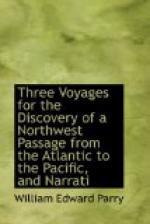The weather was now so pleasant, and the temperature in the sun so comfortable to the feelings when a shelter could be found from the wind, that we set up various games for the people, such as cricket, football, and quoits, which some of them played for many hours during the day.
At the close of the month of March, we were glad to find that its mean temperature, being -19.75 deg., when taken in conjunction with those of January and February, appeared to constitute a mild winter for this latitude. There were, besides, some other circumstances, which served to distinguish this winter from any preceding one we had passed in the ice. One of the most remarkable of these was the frequent occurrence of hard, well-defined clouds, a feature we had hitherto considered as almost unknown in the winter sky of the Polar Regions. It is not improbable that these may have, in part, owed their origin to a large extent of sea keeping open to the southeastward throughout the winter, though they not only occurred with the wind from that quarter, but also with the colder weather, usually accompanying northwesterly breezes. About the time of the sun’s reappearance, and for a week or two after it, these clouds were not more a subject of admiration to us on account of their novelty, than from the glowing richness of the tints with which they were adorned. It is, indeed, scarcely possible for nature, in any climate, to produce a sky exhibiting greater splendour and richness of colouring than we at times experienced in the course of this spring. The edges of the clouds near the sun often presented a fiery or burning appearance, while the opposite side of the heavens was distinguished by a deep purple about the horizon, gradually softening upward into a warm yet delicate rose-colour of inconceivable beauty. These phenomena have always impressed us the most forcibly about the time of the sun’s permanent setting and that of his reappearance, especially the latter, and have invariably furnished a particular subject of conversation to us at those periods; but I do not know whether this is to be attributed so much to the colouring of the sky exactly at the times alluded to, as to our habit of setting on every enjoyment a value proportioned to its scarceness and novelty.




